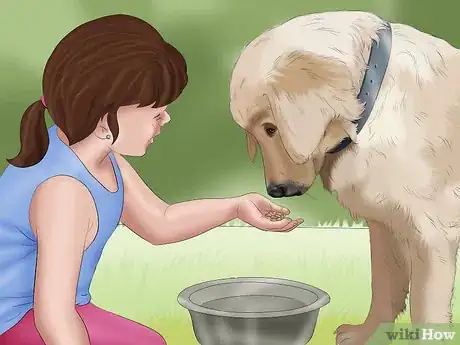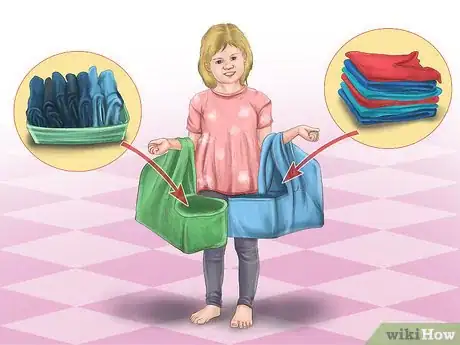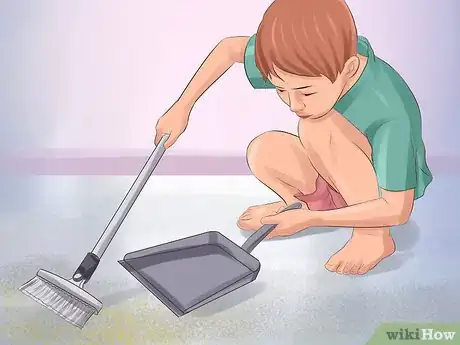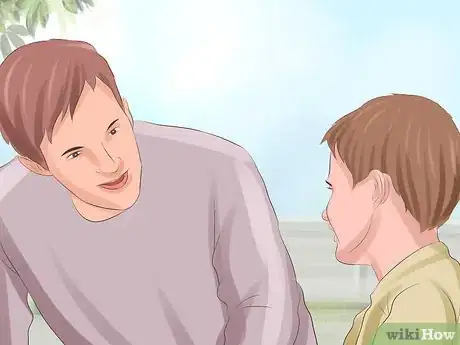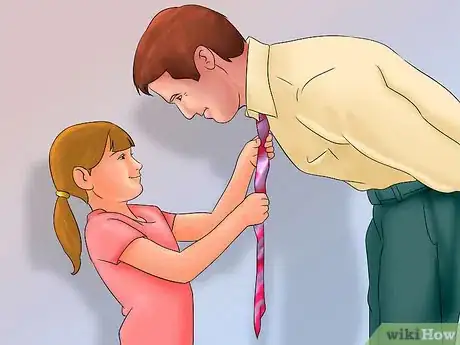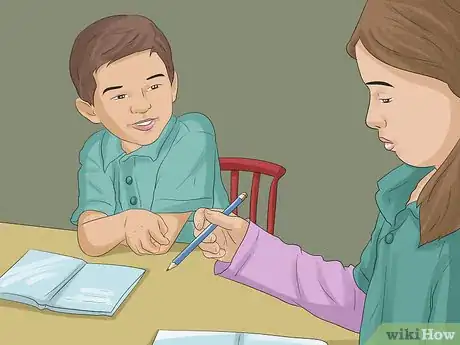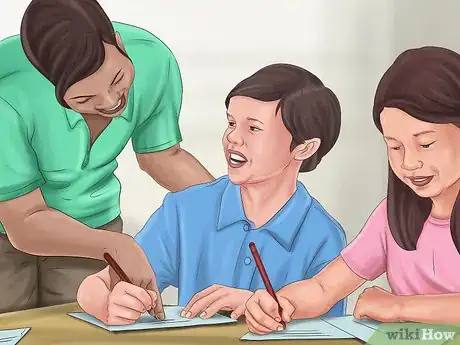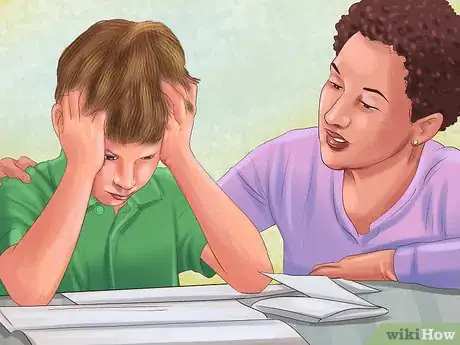This article was co-authored by Wits End Parenting. Wits End Parenting is a parent-coaching practice based in Berkeley, California specializing in strong-willed, “spirited” children with impulsivity, emotional volatility, difficulty “listening,” defiance, and aggression. Wits End Parenting's counselors incorporate positive discipline that is tailored to each child’s temperament while also providing long-term results, freeing parents from the need to continually re-invent their discipline strategies.
This article has been viewed 39,576 times.
As a parent, you can teach your child to help others in need by demonstrating or performing charitable activities for others with your child. There are numerous ways you can teach your child to help others; including showing them how to help elderly neighbors with chores, volunteering them for activities that help your community, or even helping your child recognize when their own friends need help.
Steps
Teaching Through Action
-
1Perform a volunteer activity with your child. Volunteering can be a great way to instill a sense of giving in your child. It also makes the idea of helping more than an idea but a practice that they can continue as they get older. A variety of volunteer activities probably exist in your community that you can perform with your child to demonstrate how they can help others. [1]
- Visit or call a community center, library, school, church, or other local non-profit organization to participate in a charity event or fundraising activity. Some organizations may have special activities for children. Make sure to call ahead to find out if it's the right fit.
- Try to find something that aligns with your child's interests. If they like animals, see if there are opportunities at a local animal shelter. If they like to play games, a nursing home where volunteers entertain the elderly may be a great choice.
-
2Make donations with your child. By donating used toys, clothing, and money to charity, your child can learn how their contributions can help others.
- Sort through old toys and clothing with your child to determine what they no longer play with or wear. Then take your child with you to donate these items to a charity. This way they can see that things they no longer use are helping a child much like themselves and can feel the joys of giving. It might also help to put together baskets of food and toys for those that are less fortunate. [2]
Advertisement -
3Get your child involved in the neighborhood. Helping people your child sees regularly will help them form a sense of community and to see how being helpful affects everyday people.
- Help your child run errands or perform household chores for elderly neighbors. If your child is young it can be something as simple as checking their mail. For older children they can take part in more intensive tasks like yard work.
- Suggest to your child that they help their friends in times of need; such as collecting their friends' homework assignments from school when they are ill or helping them pack their belongings when they are moving to a new home. Teach them to recognize situations people need help in, such as when they feel they need help themselves, and to take measures to alleviate a burden.
-
4Give them household tasks to do. Many parents give their children chores to do and this can be a great way to teach them to be helpful. They can be taught that they are part of the family unit and the value of everyone chipping in to help.
- Start a chore chart. This way a child can learn to do helpful tasks like taking out the trash or washing the dishes and slowly get rewarded in order to build up good behaviors. It is best if the rewards are gradual so they have to persistently help in order to build up good habits. [3]
Instilling Helpful Behaviors
-
1Explain helpful behaviors. Although showing your child what to do is great, you'll want to communicate to your child what it means to be helpful and why it's important. Explain to them that helping others makes people feel good.
- Brainstorm with your child ideas for how they can be helpful. This can be giving a gift to a grandparent, or offering to help a sibling or friend. Reinforce this behavior with compliments and tell them how proud you are that they are helping others. [4]
-
2Share stories with your child about people who help others. When you explain to your child about the ways people help others, or share specific stories of such events in your community, your child can learn examples of how people care for one another. This can help them internalize what it means to be helpful and allows it to become part of their personality.
- Find articles on the Internet or in your local newspaper about community events in which people help others, then read and share these stories with your child.
- Too many stories about people performing inspiring acts can lower your child's self-esteem. Make sure to praise your child's good qualities while still emphasizing being helpful.
- Watch television specials or news programs about people who have performed generous or charitable acts to help others.
-
3Be a strong role model. Children learn much of their behavior from watching adults. Rather than just telling your child about being helpful, you should act in a way that they can observe and learn helpful behaviors. [5]
- When your child volunteers or does community activities, make sure to join them. Also, when you're around the house, use things you talk about or see on television as teaching moments.
Raising Your Kids to be Kind
-
1Prioritize helping others. Rather than just worrying about your kid's own happiness in all situations, teach them to put the well being of others first. Being kind and worrying about the well-being of others is fundamental to creating a helpful kid. You can do this by holding them to high ethical standards whether it is in sports, school, or any social situation. [6]
- Watch how your kids interact with others at school, sporting events, or even with their siblings. Encourage them to be kind and discourage any destructive or bullying behaviors.
-
2Expand the circle of who they care about. Every child has a circle of friends and family that they naturally care about and therefore will be likely to help. The challenge is to get your kid to care about and help people outside this circle. This is important because your kids will encounter many different circles of people as they get older and will need to adapt to help them. [7]
- Teach your kid to be friendly with people they see every day that aren't their friends or family. This can be a teacher, a bus driver, or employees you see at restaurants and stores. Also encourage your children to understand the struggles of people around the world by showing them newspaper and television stories.
-
3Help your child manage destructive feelings. Their ability to help and care for others is often predicated on their ability to manage their own negative emotions. They can get overwhelmed with their own negative feelings and find it hard to act caring toward others. [8]
- Teach your kids to calm down when they feel badly. Ask them to stop, take a deep breath and count to five. Every time they get upset, remind them to undergo this process again. This will help them have the tools to be conscious of other people's feelings, even when they are upset.
Expert Q&A
-
QuestionHow do you encourage kindness in your child?
 Wits End ParentingWits End Parenting is a parent-coaching practice based in Berkeley, California specializing in strong-willed, “spirited” children with impulsivity, emotional volatility, difficulty “listening,” defiance, and aggression. Wits End Parenting's counselors incorporate positive discipline that is tailored to each child’s temperament while also providing long-term results, freeing parents from the need to continually re-invent their discipline strategies.
Wits End ParentingWits End Parenting is a parent-coaching practice based in Berkeley, California specializing in strong-willed, “spirited” children with impulsivity, emotional volatility, difficulty “listening,” defiance, and aggression. Wits End Parenting's counselors incorporate positive discipline that is tailored to each child’s temperament while also providing long-term results, freeing parents from the need to continually re-invent their discipline strategies.
Parenting Specialists o teach your child to be helpful, model that behavior whenever you can. For instance, if you see a neighbor whose car isn't starting, you might go help him. In addition, you can try an activity like giving your child a handful of quarters, then having them hide them in other kids' shoes or their lunchbox and watch to see their reaction.
o teach your child to be helpful, model that behavior whenever you can. For instance, if you see a neighbor whose car isn't starting, you might go help him. In addition, you can try an activity like giving your child a handful of quarters, then having them hide them in other kids' shoes or their lunchbox and watch to see their reaction.
References
- ↑ http://www.parents.com/parenting/better-parenting/style/volunteer-with-your-kids/
- ↑ http://www.care2.com/greenliving/teaching-children-to-give-some-helpful-tips.html
- ↑ http://www.brighthubeducation.com/parenting-grade-schoolers/119911-raising-a-helpful-child/
- ↑ http://www.care2.com/greenliving/teaching-children-to-give-some-helpful-tips.html
- ↑ https://www.washingtonpost.com/news/parenting/wp/2014/07/18/are-you-raising-nice-kids-a-harvard-psychologist-gives-5-ways-to-raise-them-to-be-kind/
- ↑ https://www.washingtonpost.com/news/parenting/wp/2014/07/18/are-you-raising-nice-kids-a-harvard-psychologist-gives-5-ways-to-raise-them-to-be-kind/
- ↑ https://www.washingtonpost.com/news/parenting/wp/2014/07/18/are-you-raising-nice-kids-a-harvard-psychologist-gives-5-ways-to-raise-them-to-be-kind/
- ↑ https://www.washingtonpost.com/news/parenting/wp/2014/07/18/are-you-raising-nice-kids-a-harvard-psychologist-gives-5-ways-to-raise-them-to-be-kind/
